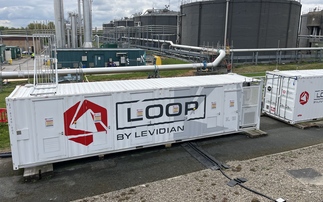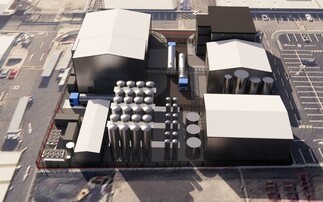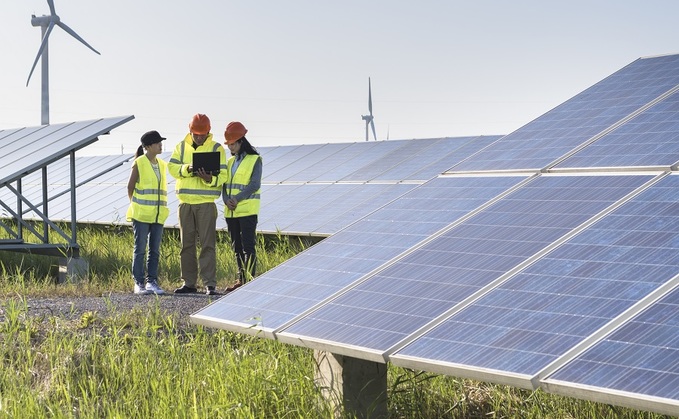
Partner Insight: Vodafone's Nicki Lyons explains the environmental benefits a 5G Standalone network could bring to traditionally carbon intensive industries
We often hear people and organisations talk about net zero - from consumers and businesses to governments and NGOs. But how often do we stop to think about tangibly, what are the steps we need to take to actually get there? How can we, in everyday life and everyday operations if you're a business, actually use technology to drive forward not only our own net zero targets but the UK's as a whole?
Climate risk and resilience is an ever-increasing priority for businesses and governments. The need for scalable solutions is pressing. At Vodafone, we believe 5G Standalone (SA) can help mitigate climate-related risk in the UK and accelerate the country's transition to net zero.
5G SA is a fully upgraded network, whereas existing 5G connections partly rely on 4G technology (which is why it is known as 5G non-standalone). Crucially, it's 5G-enabled technologies (those that can connect to the network) that could be a powerful ingredient in the UK's net zero strategy - and what's even more significant, is it's available to us now. With the right scale and investment, it could unlock huge advantages in lowering emissions and hitting net zero targets.
We recently published a study that revealed the impact 5G SA could have in important but carbon-intensive industries. In areas like energy and food & drink manufacturing, 5G-enabled technologies like Internet of Things (IoT), drones and remote monitoring systems can have a major impact on emissions reduction.
Full transition to renewables
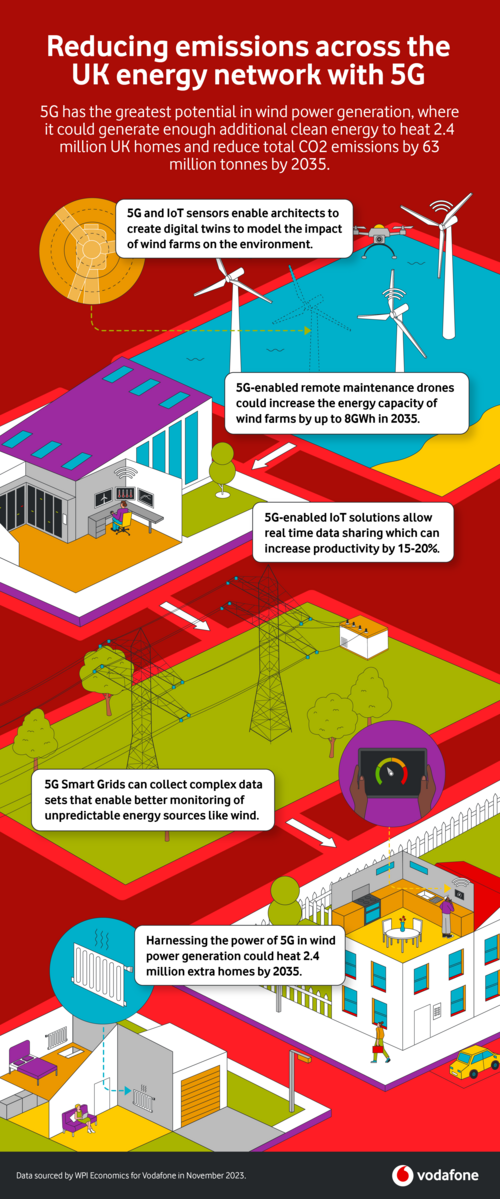
Whilst the UK has made significant strides in adopting renewable energy, we are still stalled when it comes to a full transition. However, our research shows that 5G-enabled technologies can drive efficiencies in the production of wind power and distribution to the grid.
Harnessing 5G broadly across UK wind farms could generate enough additional clean energy to heat 2.4 million UK homes by 2035 and reduce total CO2e emissions by 63 million tonnes - to put this into perspective, that's enough to heat every home in Scotland.[1]
This could be done in a few ways. Firstly, research reveals that adopting 5G-enabled remote maintenance drones on UK wind farms could increase the energy capacity of wind farms by 8GWh in 2035 and, over time, result in an additional 27TWh of energy output. A key support system and much needed solution for wind turbines that are often prone to failure.
5G-enabled IoT solutions and machine learning could also enable wake steering, whereby the position and rotation of each turbine is monitored and relayed back to the control room so the angle of each one can be optimised, allowing the turbines to be placed closer together. More turbines mean more energy output, leading to a potential 30-67 per cent improvement in the wind farm's capacity. These solutions could also leverage 5G SA's low latency for real-time monitoring ensuring operations can run smoothly.
There can also be benefits when distributing renewable energy to our homes with 5G smart grids, which use IoT to collect data in real time. This enables more effective and precise monitoring of the grid with millisecond-level precision, making distribution of energy across the grid more manageable.
UK Power Networks, for example, were faced with a challenge of integrating many new renewable energy providers into the grid, and needed a solution to increase efficiency, reduce costs and the carbon footprint of the energy supply chain. Vodafone's 5G network was used to develop Constellation, a smart substation prototype that uses 5G for real time communication over a dedicated, highly secure slice of our 5G SA network so they can react quickly when there is a problem like a power surge.
Reducing farm to fork emissions
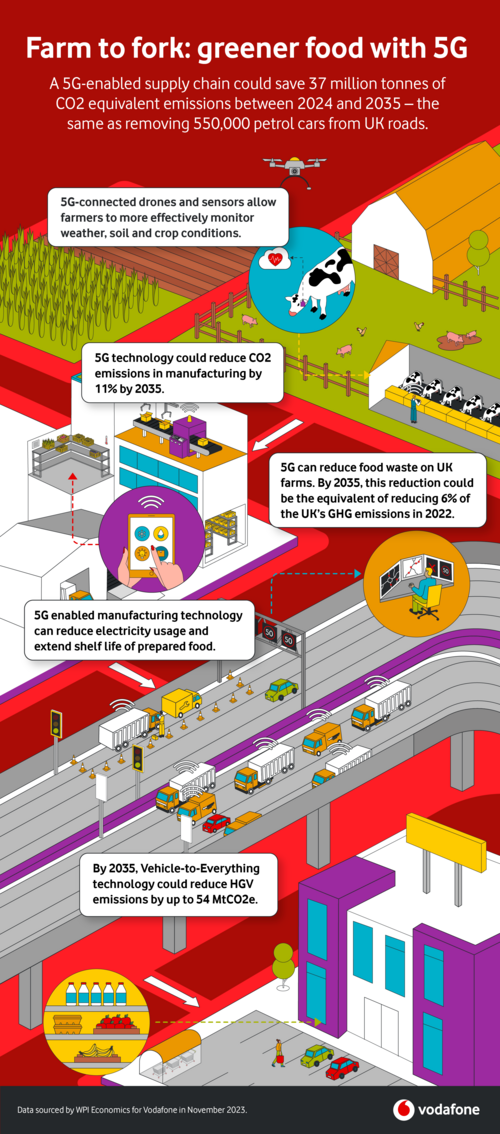
There's also huge emissions-saving potential in more traditionally carbon intensive industries, like UK food and beverage production. 5G has a role to play in every step of the supply chain, from agriculture to manufacturing and logistics.
5G-connected drones and sensors can help farmers manage their crops and livestock more efficiently by monitoring soil, fertilisers, feed and water conditions to help maximise yields and significantly reduce wastage produced on farms. If 5G-connected technology was utilised at scale across the UK, this reduction in food waste could correspond to a total saving of carbon emissions equivalent to six per cent of the UK's greenhouse gas emissions in 2022.
Once food leaves the farm and reaches processing and production lines, connected sensors on machinery and AR headsets can help speed up maintenance and repair, reducing electricity consumption and food waste. And then finally, when pallets of food are out on the road for delivery, C-V2X technology can help provide vehicles with fuel-efficient delivery routes, cutting emissions even further.
Driving towards net zero
Getting to net zero is a challenge for all, but a crucial one to overcome. Driving net zero ambitions is a key priority for our business, and I'm incredibly proud of the work we've done in this space to remain on track to achieve net zero for Vodafone's UK operations by 2027.
However, it's important we see tangible progress at scale to reach UK net zero targets, in a way that everyone can benefit from. 5G-enabled technologies like IoT, Cloud and drones are already making an impact but hold an even bigger potential to address climate change should we establish a nationwide 5G SA network.
Earlier this year, we announced our proposed merger with Three UK. One of the reasons we think it's so important is because it would enable us to deliver a best-in-class 5G SA network across the UK, much faster. Together, we plan to invest £11bn over the next 10 years as a combined business so we can deliver 5G SA to 99 per cent of the UK population by 2034. This foundation would allow us to transform how we produce and distribute clean energy in the UK and create a greener, digital future for all.
Nicki Lyons is chief corporate affairs & sustainability officer at Vodafone UK.
This article is sponsored by Vodafone
[1] This is a rough estimate using data from the Scottish Census which states there were 2,372,777 households in Scotland in 2011.



